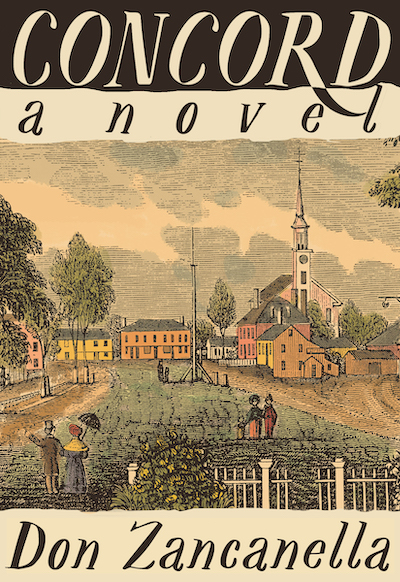
I wasn’t sure what to expect with Concord, a historical novel of New England by Don Zancanella, and I took it out of the library after reading a positive reference to it somewhere (now forgotten in my memory).
The short review: I really enjoyed it, from start to finish.
Now, I am admit I am pretty biased towards stories about writers, and Concord centers on that Massachusetts community right when Ralph Waldo Emerson, Margaret Fuller, Sophia Peabody, Henry David Thoreau and Nathaniel Hawthorne were in the same circles (only Emerson, as the elder here, had established himself at the time and setting of the novel — the others are all young and upcoming thinkers, writers, artists who have yet to make their marks on the world to any degree).
The chapters unfold, in present tense voice, through the various characters, and it is a fascinating use of historical documents and journals, as Zanacanella weaves an engaging narrative of these characters, diving deep into the inner voices and unfolding literary ambitions and emerging artistic communities that were centered around the small towns of Boston (Concord is just outside Boston).
We care about the characters, and knowing what they will come to write and create years from where they are in the story, it’s quite fascinating. I found Margaret Fuller to be the most intriguing character here, and one I knew the least about, but Hawthorne and Thoreau are interesting, too, as we learn more about how their upbringing and family inform who they are, and then inform the writings that still exist today.
As I was reading Concord, I was reminded of recent examination at various creative scenes (what Brian Eno calls “scenius”), and how the mixture of people with similar visions seem to find themselves together, pushing each other, encouraging each other, bringing a vision into being through a shared working environment.
Now, it should be noted that the characters here are white, middle to upper class New Englanders (although some of the families are struggling financially), and they are mostly privileged enough to have the time to sit around and write, or paint, or edit journals, and more. Who else at the time was making art? Plenty, I am sure, and lost to the world. Connections matter.
That fact of the world doesn’t take the pleasure out of reading this well-written novel, though, and I recommend it. (And I see he has a new book coming out this summer, about Mary and Percy Shelly, and Lord Byron … adding that to my read-later list).
Peace (in the text),
Kevin